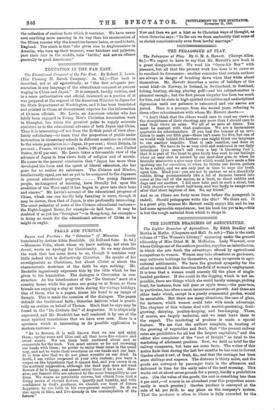EDUCATION IN THE FAR EAST.
The Educational Conquest of the Far East. By Robert E. Lewis. (The Fleming H. Revell Company. 3s. 6d.)—This book is described, not at all egotistically, as "the first adequate pre- sentation in any language of the educational conquest at present 'waging in China and Japan." It is compact, lucidly written, and in a sense authoritative and official, inasmuch as a portion of it was prepared at the request of the American Minister to Japan for the State Department at Washington, and it has been translated and printed in China at Government expense for the information of Chinese officials. Mr. Lewis, an American scholar who has lately been engaged in Young Men's Christian Association work in Shanghai, has taken the greatest pains to supply accurate statistics as to the educational advance of both Japan and China. Thus it is interesting—if not from the British point of view abso- lutely satisfactory—to learn that the proportion of pupils under instruction in elementary schools in different countries in relation to the whole population is :—Japan, 10 per cent.; Great Britain, 15 per cent. ; France, 145 per cent. ; India, 1.66 per cent.; and United States, 20-47 per cent. Mr. Lewis takes a favourable view of the advance of Japan in true views both of religion and of morals. He comes to the general conclusion that "Japan has more than developed the form and the spirit of liberal education, she has gone far to realise its substance. The Chinese and Hindoo, intellectually equal, are not as yet to be compared to the Japanese in general educational progress The young Japanese people, an-hungered of learning, have literally fed upon the erudition of the West until it has begun to grow into their bone and sinews." Mr. Lewis's account of the educational progress of China, which one can hardly help fancying is surer, though it may be slower, than that of Japan, is also profoundly interesting. The cruel pedantry of some of the Chinese educational customs— the Eight-Legged Essay, for example—is laid bare. It may be doubted if as yet the "foreigner "—in Hong-kong, for example— is doing as much for the educational advance of China as he might or ought.


























































 Previous page
Previous page